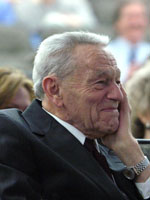
Norman Hackerman
University of Texas at Austin / Rice University
Corrosion and Science at Hand
I had the good fortune to talk with GRC founder Neil Gordon several times. He was a member of the Johns Hopkins University chemistry faculty while I was a graduate student there in the 1930s. I did not take any of his courses, but he was on my preliminary oral committee. Thus, I had a number of conversations with him in his office; in a couple of our talks he described his idea of starting what were then called the Gibson Island Conferences. He saw them as a way to move the field of chemistry forward, while providing industrial chemists with ways to reach their objectives more expeditiously.
I also had the opportunity to participate in a number of Gordon Conferences. From the late 1940s through the 1980s I attended at least one Gordon Conference each summer; in some years I attended as many as two or three. I attended the Corrosion Conference steadily. I also attended the Electrochemistry, Dynamics at Surfaces, and Chemical Education Research and Practice conferences.
The Corrosion Conferences contributed substantially to impressive uses of instrumentation along with theory and modeling to improve corrosion experimentation vastly and enhance understanding of corrosion mechanisms. The conferences also included discussions that contributed to major advances in handling corrosion problems in the field. The transfer of improved understanding of corrosion processes to field operations was particularly notable in regard to the inhibition of corrosion by the use of chemical additives.
Gordon Conference attendee interactions also brought attention to and advanced other methods of corrosion control. In fact, many of the methods currently used to explore corrosion reaction mechanisms were thoroughly discussed and advanced to their present level of understanding at the Corrosion Gordon Conferences. Early use of methods that involve spectra, microscopy, sensitive weighing capability, electrical systems insight, and purely electrochemical measurements were all discussed effectively at these conferences.
The greatest advantage of these meetings was that attendees were able to participate without worrying about being proved wrong in publication, since all discussions were officially off the record and nonattributable. Therefore, the Corrosion Conferences were effective in moving all aspects of the field forward by virtue of providing each attendee with a clear view of recent or impending developments. The same was true of the other Gordon Conferences I attended. GRC in fact had a correcting mechanism, a way to keep itself on track with only the most recent scientific progress: conferences that no longer intrigued and attracted participants were ended.
Gordon Conferences maintain an air of informality and minimized central management that allows attendees to focus on the science at hand, a feature that many with whom I have conferred feel other scientific meetings lack. Over the years I attended as many as fifty Gordon Conferences on various concerns, and I always came away believing I had acquired something of use to my research.